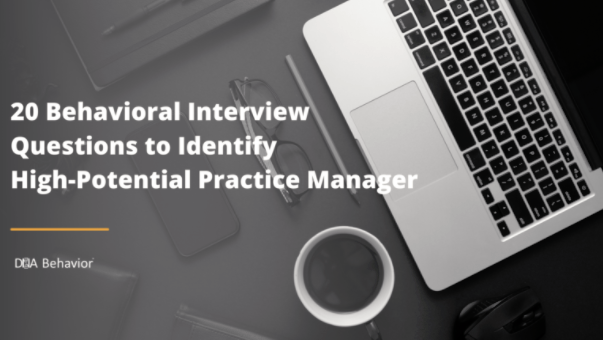Written by: Ryan Scott
The talent management process companies go through has come under much scrutiny over the last year. It is no longer a matter of finding the right candidates for the right role, managers have started taking into consideration the behavioral aspect as well. If you too are ready to embrace the right hiring strategy to meet the needs of this new season, below are the top 20 behavioral interview questions you should be asking.
Why prioritize behavioral questions?
We’ve heard it times and times again: “Great businesses are built on people”. This entails that matching the right experience and skills to the right role is what makes successful teams. However, the traditional process of screening candidates lacks an essential component that identifies high potential candidates. A behavioral assessment.
It is not only a matter of understanding your candidates’ behavioral tendencies, you should also be able to anticipate how they would react in a given situation. When recruiting a practice manager, you are recruiting for a client-facing role that requires certain agility in customer service. Knowing that behavioral intelligence deepens engagement in each human interaction makes it a must-have personality trait in your next hire. Only a behavioral assessment can accurately predict whether or not your candidate has what it takes to fill this role.
Make no mistake, this doesn’t mean that their resume is not worth taking into consideration. However, a person’s skills are a moot point if they can’t fulfill the behavioral requirements of the role, which in this case is effectively interacting with customers.
What behavioral indicators should you be looking for?
The behavioral questions you should be asking your next candidates help determine specific insights. Each role requires a given behavioral style that can only be uncovered through the right assessment. Before we dive into the questions you should be asking, let’s discuss those behavioral indicators.
Adaptability
Many hiring managers will admit that adaptability is unanimously the most screened-for skill. Even from a business perspective, in order to stay competitive, companies need to continuously adapt to the changing economy and market needs. It only makes sense to ensure new hires are inherently capable of adapting.
Culture & values
Company culture is an essential component of building successful teams. When screening candidates, you need to ensure they share the same beliefs and values as your organization, but also bring a diversity of thought and experience that will drive your company forward.
Collaboration
Hiring people who can collaborate effectively and work well with others is essential to success. This sense of teamwork may not come naturally to every candidate your interview. While we all make efforts to effectively work with our teams, some individuals have an inherent ability to prioritize it and marvel in a collaborative environment.
Leadership
There is no doubt that great leaders make great companies. When hiring for a managerial position, leadership is not only a soft skill your candidates should have, it needs to be part of their behavioral style for a successful team. Leaders are expected to inspire, motivate and unleash potential in others. It cannot be taught.
Development
A successful interview assessment not only uncovers your candidates’ skills, but it should also pinpoint development and growth potential. In today’s fast-paced work environment, it’s become expected of your employees to potentially grow into new roles and leadership positions. A behavioral assessment enables you to predict if a candidate has what it takes by screening for goal setting and self-motivation.
Productivity
Each role demands a certain level of multitasking. Candidates should be able to not only manage their time but also prioritize their tasks and decide which ones need to be tackled immediately, and which ones can wait. Hiring someone who can’t get this right means that key due dates and project timelines can fall through the cracks, ultimately hurting your business. People who can manage their time and prioritize effectively will help your business thrive.
What behavioral interview questions should be asking?
Even though each role is different, these behavioral interview questions can help you identify high-potential candidates. Download the full list below.
What’s Next?
So you’ve gone through the interview process, you’ve asked the right behavioral questions, and got all the answers you needed. You might be wondering by now, what’s next?
The next step is to determine the candidates’ behavioral styles. Through 500+ insights, the DNA Behavior discovery process allows you to uncover significant aspects of their natural behaviors and assess whether or not they are the fit for your company. Start your free trial today, and take the guess out of your hiring strategy.
Related: Do Investors See Value in Wealth Management? They Should, and Here’s Why



